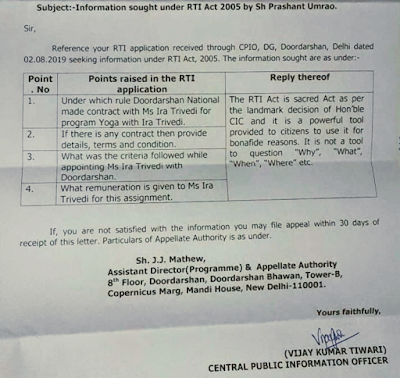The Government of India appears to have begun treating the Right to Information (RTI) Act as a holy cow. Its officials seem to believe that the Act is a sacred law, under which people shouldn’t be questioning its functioning. One recalls what Prime Minister Narendra Modi said while addressing an RTI convention in 2015: “Why should government wait for people to ask information, we will have all information out in the domain, we have nothing to hide.”
Modi’s speech was appreciated as one with vision of “proactive governance”. And yet, nearly five years down the line, we find his government failing to practice what he said, with the RTI Act slowly turning into a law of secrecy, a sacred law which does not allow people to question its decision-making process.
In reply to an RTI application filed with a government TV channel, its Central public information officer (CPIO), appointed for providing RTI replies, outrightly denied information saying the RTI Act is “sacred” and shouldn’t be used to question government actions.
The applicant had asked for a copy of the contract signed with an expert engaged by the government TV channel, which is a public authority, and also details of service conditions, rules and remuneration paid to this expert as per the contract. Denying the plea for information, CPIO also insisted that the Act can only be used for a “bona fide” purpose and queries like “why, when, where and what” shouldn’t be made.
This is a matter of deep concern. For, one of the circulars dated June 1, 2009 states that RTI cannot give justification to particular a thing, or a document, but can provide the copy of a document. This came to light in the judgement given by the Goa Bench of the Mumbai High Court in the Dr Celsa Pinto vs Goa Information Commission case. The judgement said that RTI can provide copies of documents, but need not answer the question “why”.
“All document related to any decision, noting, can definitely have answers to these questions, PIO can provide relevant documents, even if citizen asks certain question”, says the government resolution (GR), but nowhere does it say questions are banned. Despite this, the CPIO of the TV channel, while refusing to give information, mentions some judgement without quoting the source. This is a clear case of misuse of GR as also different orders by the Central Information Commission (CIC).
Actually Section 6 of the RTI Act clearly states that the RTI applicant should be assisted by PIO whenever needed in framing queries. If one wants to see copy of the list of people who got support for building toilets, and if she/he can’t frame a query, one may ask, “How many toilets were built?” PIO is supposed to give copy of the list of toilets built with government support.
Statistics from different commissions show that every year around 60 lakh citizens apply under RTI to different public authorities. Over the last few years, the number of RTI applications have decreased. A major reason is, the government does not like people to question its functioning, decision making, budgeting, expenses etc. The vision of proactive governance and transparency appears to have vanished in the air.
In fact, as things stand today, the government seems to have turned itself into a “holy cow”, which cannot be questioned anytime.
*With Mahiti Adhikar Gujarat Pahel, Ahmedabad
First published on https://www.counterview.net


